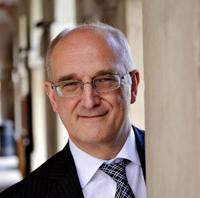20th September 2013 New Delhi, India
Interview with the Vice Chancellor of the University of Cambridge
 Professor Sir Leszek Borysiewicz, the Vice Chancellor of the University of Cambridge, was in India this week, visiting institutions in Delhi, Bangalore and Mumbai. Among other calls in Bangalore, he launched our new prize for biotech businesses to visit Cambridge and had several discussions to take forward the Bangalore Cambridge Innovation Network. I caught up with him in a rare quiet moment…
Professor Sir Leszek Borysiewicz, the Vice Chancellor of the University of Cambridge, was in India this week, visiting institutions in Delhi, Bangalore and Mumbai. Among other calls in Bangalore, he launched our new prize for biotech businesses to visit Cambridge and had several discussions to take forward the Bangalore Cambridge Innovation Network. I caught up with him in a rare quiet moment…
Welcome to India, can I ask why you’re here?
We’ve taken a strategic decision that India really matters to Cambridge for three reasons. Firstly, we’re always looking for excellence and we see a lot of that in India. Second, we have a shared culture of enquiry – Cambridge academics have over 300 research projects with Indian partners already. Thirdly, we share a desire for the outputs of research to be commericalised – something Cambridge excels at. This is my 5th visit since becoming Vice Chancellor and I keep coming back because I’m committed to building long term partnerships here.
That’s a lot air miles! Is it worth it?
Absolutely! There’s no substitute for face to face contact. Being here gives us an opportunity to showcase what we’ve got but, more importantly, listen and learn. That’s why we’ve created our new Circle of Advisors in India. I’m profoundly grateful to the people who have joined it and know their advice is going to be very valuable.
What would be your advice to an Indian academic looking to partner with Cambridge?
Start by looking at who are the key academic players in your field, and then get in touch with them direct. At Cambridge we believe in building collaboration through people at the research coal face. After the initial contact with them, the University will look to build the most promising collaborations into something bigger and more sustainable. A great example is our relationship with NCBS but we work across the board – from arts and humanities research to our meeting yesterday with the International Institute of Information Technology in Bangalore or working with business giants like Tata.
What are you looking for in Indian partners?
First and foremost, we look for research excellence – there can be no compromise on that. Where we find that, there needs to be a real willingness to collaborate with us. We want two-way traffic in all our relationships – the best of India is welcome in Cambridge. But the best of Cambridge coming here to work with our partners is just as important. That’s what characterises what I want to achieve in India.
I understand that doesn’t extend to Cambridge undergraduate campuses in India. Is that right?
That’s right. We’re not looking to set up our own undergraduate campus here for three reasons: 1. It would be very difficult to recreate the collegiate experience Cambridge students currently benefit from; 2. It’s a long way from Cambridge to India and it would be very difficult to ensure the same quality of offering – we will not compromise on excellence; 3. Our India strategy is all about collaborations –we want collaboration with Indian institutions, not setting up in competition.
This blog almost certainly won’t be the first time people have heard of Cambridge. Can you tell us something people might not have heard about?
People tell me here that Cambridge is well known for its excellent research in the Physical and Biological Sciences but, in fact, over half our students study arts and humanities disciplines. That breadth and variety is part of Cambridge’s strength.
I’d also highlight the Cambridge success story is not just about academic research – there’s a huge amount of engagement with industry. Since what is known as the Cambridge Phenomenon began some fifty years ago, more than 58,000 jobs have been created making Cambridge the highest concentration of high tech companies in Europe with a very powerful innovation eco-system – not bad for a region with a population of only 600,000, 1% of the UK population creating 17% of the national output in this field. Recently, Astra Zeneca announced plans to move their global HQ to the Cambridge Biomedical Campus citing a proximity to Cambridge’s world leading scientists as a key factor in their decision.
Final question, what’s coming up in Cambridge that we should be keeping an eye on?
It’s an exciting time to be the Vice Chancellor of Cambridge! We have the North West Cambridge development, which will add 15% to the size of Cambridge and recently took a major step forward with the first phase getting underway. There’s also the proposed relocation of Papworth Hospital onto the Addenbrooke’s site, and the project to rebuild the Cavendish laboratory. In India, I’m really gratified that the general conversations we were having here two years ago are getting much more targeted and specific. It’s a sign that our approach is paying off and the relationships we’ve built in India will go from strength to strength!
It is wonderful that Cambride University has taken to India.
We have lot many people who work devotedly, day and nitgh on research projects and such collboratoions would yield quick and benifical results.
My theses was Examined by Prof. As. Parkes, Mary Marshal Professor of Physiology and was highly satisfied witht the work. Later I continued with Dr.rer. nat in Germany and then returned to India.
I have many new things to communicate.
REGARDS, Navanit Shah